- Home
- John le Carré
Our Game Page 3
Our Game Read online
Page 3
“I had no opinion of it.”
“Did you discuss it with him?”
“No. I congratulated him.”
“Why?”
“Because that was what he wanted.”
“Do you always tell people what they want?”
“If I’m humouring somebody who is being a bore, Mr. Luck, and I want to get on with something else, yes, I very likely do,” I said, and ventured a glance at my French striking clock in its glass dome. But Luck was not so easily confounded.
“And November nineteen ninety-two—when Pettifer wrote this famous article—that would have been about the time you were retiring from whatever it was you were doing in London, I take it?”
I didn’t like Luck drawing parallels between our two lives, and I detested his assertive tone.
“Probably.”
“Did you approve of him renouncing socialism?”
“Are you asking me to tell you what my politics are, Mr. Luck?”
“I was merely thinking it must have been slightly risky for you, knowing him during the Cold War period. You being a civil servant and him, in those days, as you have said this very moment, a revolu-tionary socialist.”
“I never made any secret of my acquaintance with Dr. Pettifer. It was no crime that we were contemporaries at university or went to the same school, though you appear to think otherwise. It was certainly never an issue with my department.”
“Ever meet any of his Soviet-bloc friends? Any of the Russians, Poles, Czechs, and so forth that he knocked around with?”
I am sitting in the upper room of our safe house in Shepherd Market, sharing a farewell drink with Counsellor (Economic) Volodya Zorin, in reality head resident of the revamped Russian intelligence service in London. It is the last of these semiofficial exchanges between us. In three weeks I shall take my leave of the secret world and all its works. Zorin is a grizzled Cold War horse with the secret rank of colonel. Saying goodbye to him is like saying goodbye to my own past.
“So what shall you do with the rest of your life, friend Timothy?” he asks.
“I shall limit it,” I reply. “I shall do a Rousseau. I shall turn my back on grand concepts, cultivate my grapes, and perform good works in miniature.”
“You will build a Berlin Wall around yourself?”
“Unfortunately, Volodya, I already have one. My uncle Bob put his vineyard inside an eighteenth-century walled garden. It’s a frost trap and a haven for disease.”
“No, Dr. Pettifer never introduced me to anybody of that kind,” I replied.
“Did he talk to you about them? Who they were? What he got up to with them? The deals they were hatching together? Mutual services performed, anything of that nature?”
“Deals? Of course not.”
“Deals. Mutual services. Transactions,” Luck added with threatening emphasis.
“I’ve no idea what you’re talking about. No, he didn’t discuss anything of the sort with me. No, I don’t know what they did together. Talked hot air, most likely. Solved the problems of the world in three easy bottles.”
“You don’t like Pettifer, do you?”
“I neither like nor dislike him, Mr. Luck. I am not of a judgmental slant, as you appear to be. He’s an old acquaintance. Taken in small enough doses, he’s an amusement. I have always treated him as such.”
“You ever had a serious quarrel with him?”
“Neither a serious quarrel nor a serious friendship.”
“Did Pettifer ever offer to cut you in on a piece of the action in exchange for favours of some sort? You being a civil servant. Or an ex one. Some path you could smooth for him, a tip-off, a recommenda-tion you could put his way?”
If Luck was intending to annoy me, he was making a rare job of it. “The suggestion is totally improper,” I retorted. “I might as well ask you whether you take bribes.”
Once more, with a laboriousness calculated to exasperate me, Bryant lumbered to the rescue. “Forgive him, Mr. Cranmer, sir. Oliver is but young.” He put his hands together in mock prayer. “Mr. Cranmer, sir—please—if I may, sir.”
“Yes, Mr. Bryant?”
“I think we have distracted ourselves once more, sir. We’re rather good at that, I notice. We’re talking the telephone, and the next thing I know we’re talking a piece of history two years ago. What about today, sir? When was your most recent conversation with Dr. Pettifer on the electric telephone: put it that way. Never mind the subject or topic; just tell me when. That’s what I’m after, and I’m beginning to think that for some reason you don’t want to give me a straight answer, which is why young Oliver there was getting a bit testy just now. Yes, sir?”
“I’m still thinking.”
“Take all the time you require, sir.”
“It’s like his visits. You just forget them. He always telephones when you’re slap in the middle of things.” Making love with Emma, for instance, in the days when love was what we made. “Have I seen such and such an article in the newspaper; did I see that jackass so-and-so on television, lying in his teeth about the whatever? That’s what happens with undergraduate friendships. What was charming twenty-five years ago becomes a pest. You grow up. Your friends don’t. You adjust. They stay the same. They become old kids, then they become bores. That’s when you switch off.”
I did not like Luck’s glower any more than I liked Bryant’s moustachio’d leer.
“Now, by switch off, sir,” said Bryant, “do we mean here literally switch off? Switch off our telephone? Have it disconnected? Because that is what I believe we did on the first of August last, Mr. Cranmer, sir, and did not resume contact with the outside world for three full weeks thereafter. At which point we acquire a new number.”
I must have been ready for him, for I struck back quickly, and at both of them.
“Inspector Bryant. Sergeant Luck. I think I’ve had rather more than enough of this. One minute you’re engaged in a missing person enquiry. The next you’re asking a lot of extraneous nonsense about unethical contacts while I was a civil servant, my politics, whether I’m a security risk, and why I went ex-directory.”
“So why did you?” Luck said.
“I was being intruded upon.”
“Who by?”
“Nobody of the smallest consequence to you.”
Bryant’s turn. “Now, if that was the case, sir, why didn’t you get in touch with the police? Not as if you’re a wilting violet, is it? We’re more than happy to assist with nuisance phone calls, be they threatening or obscene. In collaboration with British Telecom, naturally. No need to cut yourself off from the outside world for three weeks.”
“The calls I found objectionable were neither threatening nor obscene.”
“Oh? So what were they, sir, if you don’t mind?”
“They were not your business. They aren’t now.” I added a second excuse where one would have served well enough: “Besides, three weeks without the telephone are a rest cure.”
Bryant was delving in an inside pocket. He extracted a black notebook, removed the elastic band, and opened it longways on his lap.
“Only you see, sir, me and Oliver here have been making quite a study of the Doctor’s phone calls, going back over his entire period of residence in Bath,” he explained. “We are highly fortunate in the Doctor having a very Scottish landlady and a shared telephone line. Every outgoing call was timed and noted down. Her late husband the Commander started the practice. Mrs. Macarthur carries it on.”
Bryant licked a thumb and turned a page.
“Incoming calls, the Doctor had any number of them, many from far-flung places by the sound of them, and a lot cut off in midstream. Quite often the Doctor was speaking this language she can’t place, too. But outgoing, that’s different. When we’re talking outgoing, you were the Doctor’s star telephone partner until August first this year, according to Mrs. Macarthur. Six hours and twenty minutes the Doctor notched up with you in May and June alone.”
He paus
ed, but I still didn’t interrupt him. I had played an impossible hand and lost. I had wriggled and ducked, I had hoped to satisfy them with half-truths. But against such a well-planned assault I had no defence. Casting round for a scapegoat, I lighted upon the Office. If the fools in the Office were aware of Larry’s disappearance, why the devil hadn’t they sent me an early warning? They must know the police were looking for him. Then why didn’t they stop them? And if they couldn’t stop them, why leave me dangling in the wind, not knowing who knew what or why?
I am attending my last meeting with Jake Merriman, Head of Personnel. He is sitting in his carpeted rooms overlooking Berkeley Square, snapping his Rich Tea biscuit in half while he moans about the Wheel of History. Merriman has played the English bloody fool so long that neither he nor anybody else knows anymore whether he is the genuine article.
“Done your job, Tim, old boy,” he complains in his drawled, echoless voice. “Lived the passion of your time. Who can do more?”
I say, Who indeed. But Merriman has no ear for irony except his own.
“It was there, it was evil, you spied the hell out of it, and now it’s gone away. I mean we can’t say, simply because we won, there was no point in fighting, can we? Much better to say, Hooray, we trounced them, the Commie dog is dead and buried, time to move on to the next party.” He manages a little whinny of amusement. “Not Party with a capital P. The small kind.” And he subdivides one section of his Rich Tea before lowering the point of it into his coffee.
“But I’m not invited to the new party, am I?” I say.
Merriman never gives you the bad news himself. He prefers to drag it out of you.
“Well, I don’t think you are, Tim, are you?” he agrees, with a commiserating tilt of his fleshy head. “I mean twenty-five years do rather shape the mind, don’t they? I’d have thought you’d be far better off agreeing you’d served your stint, and time to find pastures new. After all, you’re not a pauper. You’ve got your nice place in the country, and a little bit of your own. Your dear uncle Robert has had the grace to die, which is more than we can say for some rich uncles. What could be jollier?”
There is a saying in the Office that you have to be careful with Merriman lest you resign by mistake, rather than waiting for him to sack you.
“I don’t think I’m too old to take on new targets,” I say.
“Cold Warriors of forty-seven don’t recycle, Tim. You’re all far too nice. You have too many rules of engagement. You’ll tell Pettifer, won’t you? It’s best coming from you.”
“Tell him what, exactly?”
“Well, the same as I’ve just told you, I suppose. You don’t think we can direct him against the terrorist target, do you? Do you know what he’s costing me? Just for his retainer? Not to mention his expenses, which are a joke.”
“Since it’s my section that is responsible for paying him, yes.”
“Well, I mean for what anymore? Hang it all, when you’re trying to persuade chaps to join the Baghdad Brotherhood for you or whatever, you need every penny you can get. The Pettifers of this world are extinct. Admit it, says I.”
Too late, as usual, I start to lose my temper. “That wasn’t the Top Floor’s ruling when his case last came up for review. It was agreed by all parties that we would wait and see whether Moscow dreamed up a new role for him.”
“We waited and we got bored.” He slides a cutting from the Guardian across the desk at me. “Pettifer needs a context, or he’ll be trouble. Talk to the resettlement people. Bath University is looking for a linguist who can double up on something called global security, which sounds to me like the oxymoron of all time. Temporary but could be permanent. Their Big I Am is ex-Office and well disposed, provided Pettifer keeps his nose clean. I didn’t know Bath had a university,” he adds grouchily, as if nobody ever tells him anything. “Must be one of those Techs in drag.”
It is the worst moment of our twenty-something operational years together. Life has decreed that we sit in parked cars on hilltops. This time we are in a lay-by on a hilltop outside Bath. Larry sits beside me, his face buried in his hands. Above the trees I can make out the grey outlines of the university that we have just inspected and the two pairs of dirty metal tubular chimneys that are its ominous landmark.
“So what do we believe in now, Timbo? Sherry at the dean’s and stripped pine furniture?”
“Call it the peace you fought for,” I suggest lamely.
His silence, as always, is worse than his abuse. He reaches up his hands but finds, instead of free air, the roof of the car.
“It’s a safe haven,” I say. “For half the year you’re bored, for the other half you’re free to do whatever you want. That’s a damned sight better than the world average.”
“I’m not tameable, Timbo.”
“No one’s asking you to be.”
“I don’t want a safe haven. I never did. To hell with safe havens. To hell with stasis. To hell with dons and index-linked pensions and cleaning my car on Sundays. To hell with you too.”
“To hell with history, to hell with the Office, to hell with life, and to hell with growing old,” I suggest, enlarging on his thesis for him.
Nevertheless I have a lump in my throat, I can’t deny it. I would put my hand on his shoulder, which is trembling and hot with sweat, except that it is not our way to touch each other.
“Listen,” I say to him. “Are you listening? You’re thirty miles from Honeybrook. You can come every Sunday for lunch and tea and tell me how bloody it all is.”
It is the worst invitation I ever extended to anyone in my life.
Bryant was talking to his notebook, which he held before his face while he taunted me with the record of Larry’s phone calls.
“Mr. Cranmer-sir also features on the incomings, I see. It’s not all your funny foreigners. An educated gentleman, always very polite, more like the BBC than human, is how the landlady describes you. Well, that’s exactly how I’d describe you myself, no disrespect.” He licked a finger and gaily flipped a page. “Then all of a sudden you turn round and cut off the Doctor without a shilling. Well, well. No more incomings, no more outgoings, for three whole weeks. What you might term a radio silence. Slammed the door in his face, you did, Mr. Cranmer-sir, and me and Oliver here were wondering why you did that to him. We wondered what had gone on before you cut him off and what stopped going on once you did. Didn’t we, Oliver?”
He was still smiling. If I had been taking my last walk to the gallows his smile would not have altered. My anger against Merriman swung gratefully towards Bryant.
“Inspector,” I began, gathering heat as I went. “You call yourself a public servant. Yet at ten o’clock on a Sunday night, without a warrant and without an appointment, you have the impertinence to barge your way into my house—two of you—”
Bryant was already on his feet. His facetious manner had fallen from him like a cloak. “You’ve been very kind, sir, and we’ve overstayed our welcome. We got carried away by your conversation, I expect.” He slapped a card on my coffee table. “Give us a call, sir, won’t you? Anything at all. He rings, he writes, he turns up on your doorstep, you hear something from a third party which could be of assistance in locating him . . .” I could have knocked his insinuating smile through his head. “Oh, and in case the Doctor surfaces, would you be so kind as to give us your new telephone number? Thank you.”
He scribbled to my dictation while Luck looked on.
“Nice piano,” Luck said. He was suddenly too close to me, and too tall.
I said nothing.
“You play, do you?”
“It’s been known of me.”
“Your wife away?”
“I have no wife.”
“Same as Pettifer. What branch did you say you were? Of the civil service? I forget.”
“I didn’t mention a branch.”
“So what were you?”
“I was attached to the Treasury.”
“As a linguist?”
/>
“Not especially.”
“And you didn’t find that too negative? The Treasury? Cropping public spending, pegging pay-rounds, no more money for the hospitals? I think that would get me down.” Again I disdained a reply. “You should keep a dog, Mr. Cranmer. A place like this. Crying out for one.”
The wind had dropped dead. The rain had ceased, leaving a pall of ground mist that made autumn bonfires of the Peugeot’s headlights.
2
I am not given to panic, but that night I came as near to it as I had ever come. Which of us were they pursuing—Larry or me? Or both of us? How much did they know of Emma? Why had Checheyev visited Larry in Bath and when, when, when? Those policemen weren’t looking for some fringe academic who had gone walkabout for a few days. They were on a trail, smelling blood, hunting someone who appealed to their most aggressive instincts.
Yet who did they think he was—Larry, my Larry, our Larry? What had he done? This talk of money, Russians, deals, Checheyev, me, socialism, me again . . . How could Larry be anything except what we had made him: a directionless English middle-class revo-lutionary, a permanent dissident, a dabbler, a dreamer, a habitual rejecter; a ruthless, shiftless, philandering, wasted, semicreative failure, too clever not to demolish an argument, too mulish to settle for a flawed one?
And who did they think I was—this solitary retired civil servant, speaking his foreign languages to himself, making wine, and playing the Good Samaritan in his desirable Somerset vineyard? You should keep a dog indeed! Why should they assume, just because I was alone, that I was incomplete? Why pursue me, merely because they couldn’t get their hands on Larry or Checheyev? And Emma—my fragile, or not so fragile, departed mistress of Honeybrook: how long before she too is in their sights? I went upstairs. No, I didn’t. I ran. The telephone was by my bed, but as I lifted the receiver I humbled myself by forgetting the number I meant to dial, a thing that in the tightest operational situations had never happened to me through my entire secret life.

 The Honorable Schoolboy
The Honorable Schoolboy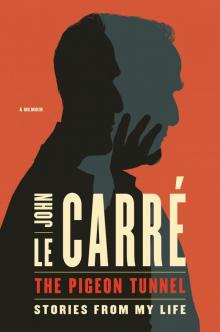 The Pigeon Tunnel: Stories From My Life
The Pigeon Tunnel: Stories From My Life Single & Single
Single & Single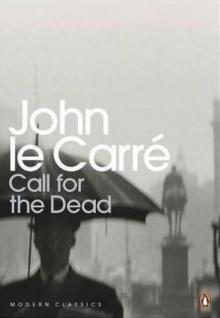 The Spy Who Came in From the Cold
The Spy Who Came in From the Cold The Looking Glass War
The Looking Glass War The Night Manager
The Night Manager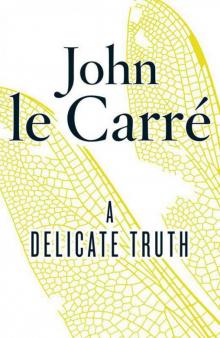 A Delicate Truth
A Delicate Truth A Perfect Spy
A Perfect Spy The Little Drummer Girl
The Little Drummer Girl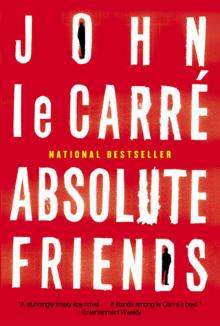 Absolute Friends
Absolute Friends A Murder of Quality AND Call for the Dead
A Murder of Quality AND Call for the Dead The Russia House
The Russia House The Tailor of Panama
The Tailor of Panama Tinker, Tailor, Soldier, Spy
Tinker, Tailor, Soldier, Spy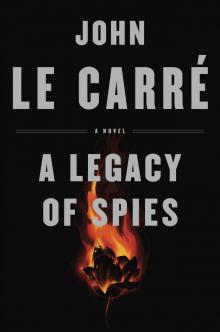 A Legacy of Spies
A Legacy of Spies The Mission Song
The Mission Song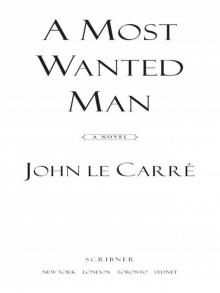 A Most Wanted Man
A Most Wanted Man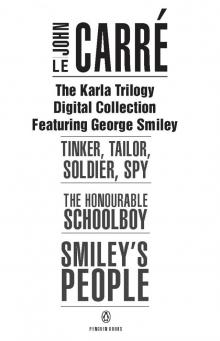 John Le Carré: Three Complete Novels
John Le Carré: Three Complete Novels The Secret Pilgrim
The Secret Pilgrim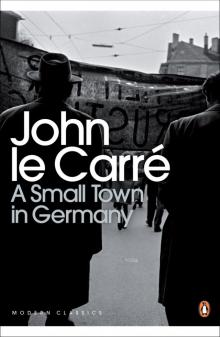 A Small Town in Germany
A Small Town in Germany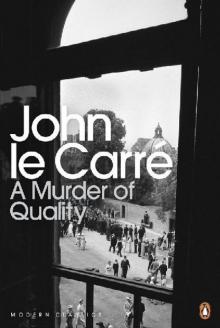 A Murder of Quality
A Murder of Quality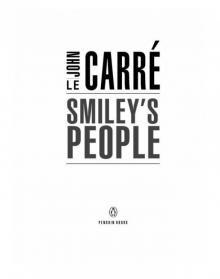 Smiley's People
Smiley's People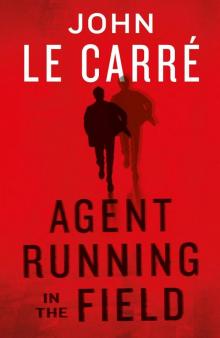 Agent Running in the Field
Agent Running in the Field The Spy Who Came in from the Cold s-3
The Spy Who Came in from the Cold s-3 The Pigeon Tunnel
The Pigeon Tunnel The Russia House - 13
The Russia House - 13 The Honourable Schoolboy
The Honourable Schoolboy Call For The Dead s-1
Call For The Dead s-1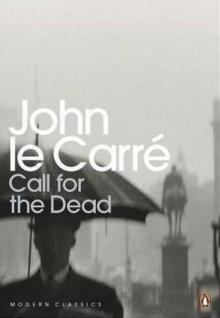 Call for the Dead
Call for the Dead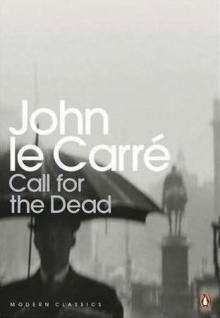 Call for the Dead - 1
Call for the Dead - 1